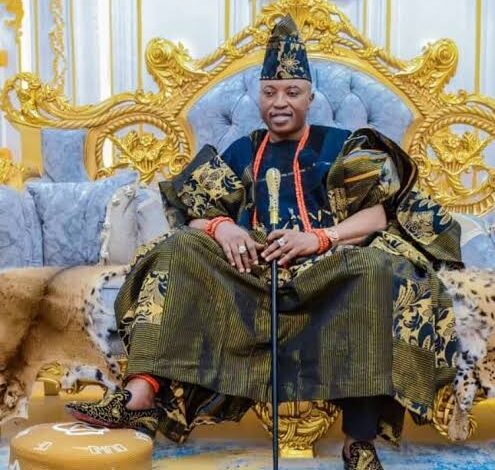Oba Abdulrasheed Akanbi: Redefining Traditional Leadership

Cultural shift is a transformative force that drives growth, innovation, and inclusivity, playing a pivotal role in shaping the future of organizations, communities, and societies. As the world continues to evolve, understanding the drivers and impact of cultural shift is crucial for harnessing its potential and unlocking new opportunities for collaboration, creativity, and prosperity. By embracing cultural shift, we can foster a more adaptable and inclusive environment, ultimately leading to a brighter future for all.
In the realm of traditional leadership, few figures have exploited the inevitabilty of the power change and generated as much attention and debate as Oba Abdulrasheed Akanbi, the Oluwo of Iwo. As a monarch, he has embarked on a mission to redefine the role of traditional leaders in contemporary society, blending modernity with tradition and sparking controversy in the process.
A Visionary Approach
Oba Abdulrasheed Akanbi’s approach to traditional leadership is characterized by his willingness to challenge convention and push boundaries. With a background in business and international development, he brings a unique perspective to the throne, leveraging modern media and public engagements to connect with his subjects and promote cultural heritage. His adoption of social media as a tool for engagement has enabled him to reach a wider audience, discussing topics such as entrepreneurship, discipline, and cultural pride with the youth ¹.
Cultural Revival
The Oluwo of Iwo, Oba Abdulrasheed Adewale Akanbi, is a dynamic leader who has been making waves with his unconventional approach to traditional rulership. Since his enthronement in 2015, he has been a thorn in the flesh of traditionalists, with his modern and progressive ideas sparking controversy and debate. Despite this, Oba Akanbi remains committed to his vision for Iwo, championing initiatives that promote cultural heritage, education, and community development. His plans for a grand museum of Yoruba culture in Iwo aim to make the town a global hub for indigenous history, art, and scholarship, showcasing the richness and diversity of Yoruba heritage ¹ ².
One of the most striking aspects of Oba Akanbi’s leadership is his ability to blend tradition with modernity. While promoting Yoruba customs and language, he has also demonstrated a willingness to adapt to changing times, leveraging modern media and technology to engage with his subjects and promote his vision. His humanitarian work, both within and outside Nigeria, has earned him recognition and respect. However, his tenure has not been without controversy, with criticisms surrounding his adoption of unconventional titles and his support for Sharia law in the South-West region. Despite these challenges, Oba Akanbi remains a significant figure in Yoruba cultural landscape, pushing boundaries and redefining traditional leadership for the 21st century ³ ¹.
Strong Commitment to Philanthropy and Community Engagement
The Oluwo of Iwo, Oba Abdulrasheed Adewale Akanbi, has demonstrated a strong commitment to philanthropy and community engagement. Despite controversies surrounding his reign, he has established initiatives aimed at improving the lives of his subjects. He has established the Oluwo Food and Clothing Bank, providing regular support to those in need, including food and clothing.
The Oluwo’s efforts have also extended to education, healthcare, and infrastructure development, demonstrating his dedication to the welfare of his people. By providing support to those in need, he is helping to improve their quality of life and promote overall well-being. His commitment to community engagement and development has made a positive impact on the lives of his subjects.Oba Abdulrasheed Adewale Akanbi, the Oluwo of Iwo, has been driving development in his kingdom through various initiatives. He has rehabilitated federal and state roads, renovated key structures, and facilitated employment opportunities for his subjects. His philanthropic efforts have also had a significant impact, providing support to orphans, widows, and the less privileged.
The Oluwo has leveraged his influence to attract investments and stimulate economic progress in Iwo. His modernization efforts extend beyond physical development, as he has also promoted cultural heritage by establishing a grand museum of Yoruba culture. He engages with youth through social media and public discussions on entrepreneurship, discipline, and cultural pride.
The Oluwo’s development initiatives have transformed Iwo, earning recognition from other traditional leaders. The Akarigbo of Remoland, Oba Babatunde Ajayi, has praised the Oluwo for giving Iwo a positive face on the global map. Overall, Oba Akanbi’s efforts demonstrate his commitment to the welfare and progress of his people.
A New Generation of Leadership
Oba Abdulrasheed Akanbi remains a significant figure in Yoruba cultural landscape .The Oluwo of Iwo, Oba Abdulrasheed Adewale Akanbi, is a visionary leader who has demonstrated a unique ability to balance tradition with modernity. He engages with contemporary challenges while preserving cultural heritage, showcasing his commitment to progress and innovation.
The Oluwo’s leadership style has earned him recognition beyond Iwo, particularly in peace and conflict resolution. He has successfully intervened in inter-community disputes and tensions between traditional institutions and government, demonstrating his ability to navigate complex issues and find solutions.By combining traditional values with modern approaches, the Oluwo has positioned himself as a forward-thinking leader who is dedicated to the welfare and progress of his people. His efforts have made a positive impact on his community, and his leadership continues to inspire and motivate others.
Oluwo has not done any damage to the Yoruba culture , he is only agent of change . Moreover , change is inevitable .The impact of cultural shift can be profound, leading to improved collaboration and teamwork, enhanced creativity and problem-solving, increased employee satisfaction and retention, and better alignment with organizational goals. When individuals from diverse backgrounds and perspectives come together, they bring unique experiences and ideas that can foster creativity and innovation. Moreover, cultural shift encourages experimentation, risk-taking, and learning from failure, leading to enhanced creativity and problem-solving capabilities.
Leadership plays a crucial role in driving cultural shift. Leaders who champion change and demonstrate a commitment to new values and practices can inspire others to follow suit. Employee engagement and participation are also essential, as they bring valuable insights and perspectives that can inform and shape cultural shift.
Changing demographics and societal trends also drive cultural shift. As populations become increasingly diverse, organizations must adapt to meet the needs of their customers and employees. Technological advancements have also transformed the way we work and interact, enabling new forms of collaboration and communication.
The benefits of cultural shift are numerous. By embracing change and promoting inclusivity, adaptability, and innovation, organizations can unlock transformation and growth. This can lead to increased competitiveness, improved customer satisfaction, and enhanced financial performance.
Oba Abdulrasheed Akanbi’s leadership style is a testament to the evolving nature of traditional leadership. While his approach may be unconventional, it reflects a deep commitment to cultural heritage and community development. As he navigates the complexities of traditional leadership in a rapidly changing world, his impact will likely be felt for generations to come.




